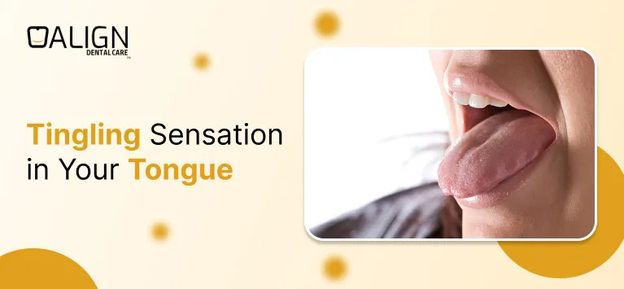
Have you ever felt a strange sensation on your tongue, like pins and needles or something crawling on it? This tingling feeling, known as paresthesia, can happen for many reasons. While it may seem harmless, it’s important to understand why your tongue feels tingly, as it can be a signal from your body. Whether it’s a temporary reaction to spicy foods or a sign of a more serious health issue, being aware of the causes can help you take the right steps. In this blog, we’ll look into the causes of tongue tingling, common symptoms, possible triggers, and when it’s necessary to see a doctor.
What is Tongue Tingling?
Tingling, medically known as paresthesia, is an unusual sensation that can occur in various parts of the body, including the tongue. It feels like tiny needles pricking the surface and may last for a short time or persist, depending on the underlying cause. If the tingling continues without improving, it might indicate a more serious issue.
Common Causes of Tongue Tingling
Tongue tingling can be triggered by a wide range of factors, from harmless dietary choices to more significant medical conditions. Here are some common causes:
Eating Hot or Spicy Foods Spicy foods can irritate the nerves in your tongue, leading to a tingling or numbing sensation. Capsaicin, the compound responsible for spiciness, stimulates nerve endings, while hot foods and beverages can burn the tongue, causing temporary tingling. These sensations typically fade within a few hours.
Allergic Reactions Food allergies, especially to fruits, nuts, or shellfish, can cause a tingling sensation in the tongue. This is part of oral allergy syndrome (OAS), which can include swelling, itching, or difficulty breathing. Seek medical help if you suspect an allergy, as some reactions can be severe.
Vitamin Deficiencies A deficiency in certain vitamins, particularly B12, can lead to tongue tingling. Vitamin B12 plays a crucial role in nerve function, and low levels can cause nerve-related symptoms like tingling, burning sensations, and swelling. Fatigue and memory problems may also be present. Vitamin supplements or dietary changes can help resolve this.
Health Conditions Associated with Tongue Tingling
While some cases of tongue tingling are temporary and related to food, certain health conditions can also be responsible. Here are a few conditions linked to tongue tingling:
Anxiety and Stress Stress and anxiety can cause a tingling sensation in the tongue due to the body’s fight-or-flight response, which increases circulation and muscle tension. Symptoms may include dry mouth, rapid breathing, and jaw tightness. Stress management techniques can help reduce these symptoms.
Oral Thrush Oral thrush, a fungal infection in the mouth, can cause tingling or burning on the tongue. It often appears as a white coating on the tongue and may cause discomfort while eating. Antifungal treatment is usually effective in clearing the infection.
Multiple Sclerosis (MS) Multiple sclerosis, a disease of the central nervous system, can cause tingling in various body parts, including the tongue. If you experience persistent tingling along with other symptoms like muscle weakness or coordination issues, seek medical advice.
Other Possible Causes of Tongue Tingling
Several other factors can lead to tongue tingling, including:
Nerve Damage Injuries to the tongue or mouth, including from dental procedures like extractions or fillings, can affect the nerves, causing temporary tingling. This usually resolves as the area heals.
Acid Reflux Stomach acid entering the throat and mouth can cause a sour taste and tingling on the tongue. Reducing acidic foods and eating smaller portions can help manage this.
Medications Certain medications, such as those for high blood pressure or chemotherapy, may cause tongue tingling. Consult your doctor if this occurs after starting a new medication.
When to See a Doctor for Tongue Tingling
While tongue tingling is often harmless and short-lived, it can sometimes indicate a more serious issue. See a doctor if:
-
The tingling persists or worsens over time.
-
You have trouble breathing or swallowing.
-
You suspect an underlying health condition like MS or an allergy.
Managing and Preventing Tongue Tingling
Managing tongue tingling depends on its cause, but here are some steps you can take to prevent or reduce the sensation:
Practice Good Oral Hygiene Keeping your mouth clean helps prevent infections like oral thrush that can cause tingling. Brush your teeth, clean your tongue, and floss regularly.
Manage Stress Since stress can cause tingling, practicing relaxation techniques like meditation or breathing exercises can help manage symptoms.
Eat a Balanced Diet Ensure you’re getting enough vitamins, especially B12, to support nerve health. Consider including foods rich in B12, like fish and dairy, or taking supplements if needed.
Conclusion
A tingling sensation in the tongue might seem odd but is often temporary and harmless. It can be caused by factors like food, stress, or even a medical condition. If the tingling persists or is accompanied by other symptoms, consult a doctor. With proper care, you can manage tongue tingling and maintain good oral health.
To know more, visit: https://www.aligndentalcare.lk/tingling-sensation-in-your-tongue/
